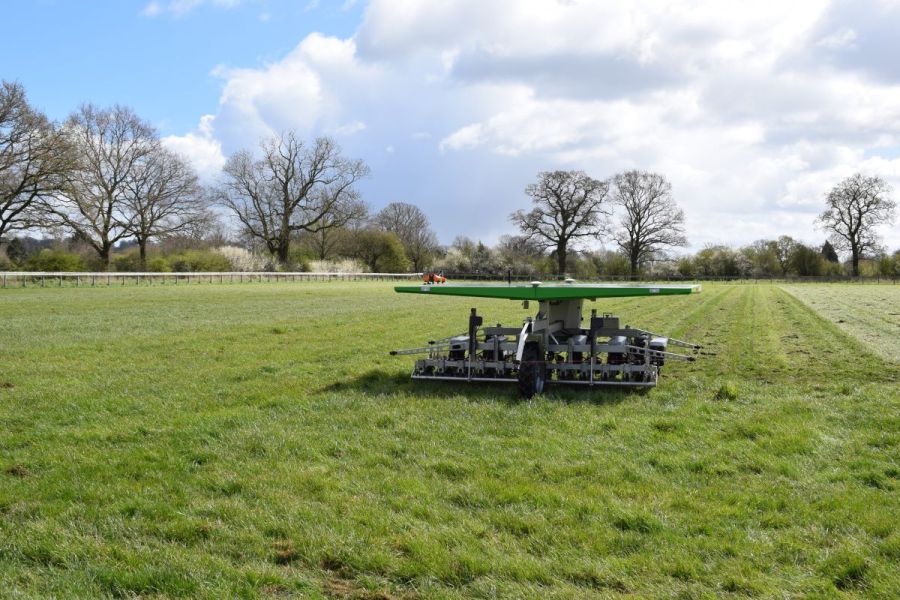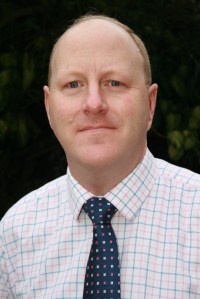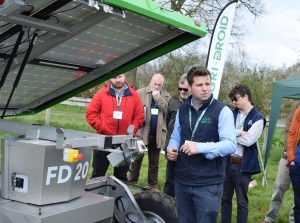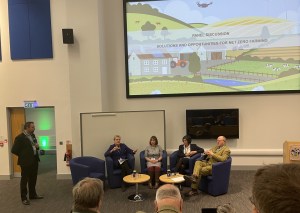
Download PDF
In a bid to reach net zero, what practical solutions are available to help growers decarbonise farming? CPM joined conference delegates at Harper Adams University to find out.
By Janine Adamson
The race is on – according to the NFU target, the UK must achieve net zero by 2040. Although verging on being a broken record, it’s a feat that can’t be ignored. The gravity of which was made clear at RASE’s Net Zero in Practice event held at Harper Adams University.
Given the event was oversubscribed, it clearly indicates that farmers and the wider industry are invested in finding out what they can do at an individual level to contribute to the cause.

There are far too many unconfident farmers because we’re asking them to make extraordinary, unachievable change, said Lord Deben.
To provide wider context, in a rousing and somewhat politically-themed keynote address, Lord Deben explained that farming requires more confidence. “There are far too many unconfident farmers because we’re asking too much of them, asking them to make extraordinary, unachievable change,” he said.
“Farmers are crucial to our future and their central role is to produce food, but we then introduce the possibility of them mitigating climate change. There has to be a balance between the two.”
He shared concerns that, politically, the government can’t deliver on promises, whereas delivery is something that farmers excel at. He believes work should be done to communicate this opportunity to politicians and incite ‘real policy’ development.
“Climate change is dangerous, it can’t be put off because it’s putting the world in danger. We have to address it and be confident, backed by a political system that champions the food production required by the entire nation.”
The event, coined as a first-of-its-kind for farmers, focused on three key areas – valorisation of waste, energy and fuel, autonomous vehicles and robotics, and decarbonising livestock production. In the first of two panel sessions for all delegates, experts from across these areas presented their thoughts on the solutions and opportunities to help tackle net zero.
NFU Cymru’s deputy president, Abi Reader, is a third generation mixed farmer and formed part of the panel. As well as home to 200 dairy cows, 150 sheep and 90 beef cattle, her farm in Wenvoe in Wales grows around 50ha of arable crops.
During Abi’s presentation she explained that meeting a forestry expert on the social media platform Twitter helped to realign her views on carbon sequestration. Before this, she was unable to identify all of the required land for agroforestry and carbon targets without compromising farm productivity.
“He (the forester) explained that trees should provide a farm income within two to five years of being planted, and that we could achieve this through two means,” said Abi.
“This involved planting a short rotation coppice grown in strips to harvest for purposes such as low-carbon concrete. This would then be interspersed with Sida – a perennial biomass crop from Poland that’s harvested twice a year.”
Abi explained that Sida is an evergreen high protein shrub that’s mainly used as a bioenergy crop, but also has the potential to replace soya in animal feed. She believes it’s an exciting profit-making solution and, as a result, is now putting the plan into action through a trial with Sida Agroforestry CIC.
“This all demonstrates the opportunity of farmers working alongside foresters. Trees are a complex area so we have to develop our knowledge. Agroforestry offers potential for a different stream of income, I chose to explore this rather than let my own preconceptions stand in the way. If it works, hopefully others can also benefit,” she said.

Stephen Briggs operates a ‘stacked system’ – the integration of arable crops with fruit trees, grown on the same land at the same time.
Also presenting was Stephen Briggs of Bluebell Farms – a 110ha organic operation in Peterborough. The farm made the shift to grow 52ha of agroforestry in a bid to improve soil health and improve multifunctionality.
According to Stephen, the biggest input available to farmers is the sun. “I realised that the farm was missing capturing this free resource, and that nature had figured it out a long time ago,” he said.
Tenant farmer Stephen’s solution was to operate a ‘stacked system’ – the integration of arable crops with fruit trees, grown on the same land at the same time. He believes this equates to a 20% productivity increase compared with monoculture cropping, while sequestering around 4.5t/ha of carbon.
He admitted that although complicated to manage, this stacking is a ‘climate smart’ breakthrough for agriculture. To conclude, he offered sage advice, reminding the audience that life’s short and should be enjoyed, and that innovation is key.
Having signed up to specific technical sessions, delegates then dispersed to different areas of the university campus to hear sector-specific perspectives. CPM first headed to the autonomous vehicles and robotics session, led by the team behind Hands Free Hectare.
Part of this was an introduction to Farmdroid FD20 – imported by Agri-Droid and marketed as ‘the world’s first seeding and weeding robot’. The robot is solar panel-driven and CO2 neutral, developed with the initial aim of reducing the cost of growing organic sugar beet.

According to Chris Brettell, Farmdroid FD20 can help growers achieve considerable yield uplifts for high value crops.
It operates by using GPS to mark the placement of the crop at sowing, then mechanically weeds both between and within the rows. It works with a range of seeds up to 8mm including beet, onion and spinach. According to Agri-Droid’s Chris Brettell, the robot is a ‘game-changer’ for productivity and yield uplift while playing a role in achieving net zero.
“Weeds not only suck up nutrients from the ground but also shade a crop during establishment. Using Farmdroid FD20 can mean considerable yield uplifts for high value crops,” he said. “The yield gains mean there’s the potential to recoup the cost of the robot within one to two years.”
Chris explained that this is just the first iteration of the machine, with further developments including spot spraying on the way next year.
According to Kit Franklin from Harper Adams, the robot is an effective way to unlock greater diversity in cropping. “Farmdroid FD20 is a facilitator – it opens up the prospect of growing high value crops such as vegetables, which might have previously been unthinkable due to the weed control burden.”
This flexibility has already been demonstrated by confetti business Shropshire Petals, which purchased three of the robots to assist with delphinium planting.

Expert panel sessions debated topics such as solutions and opportunities to help farmers tackle net zero.
The second technical session CPM attended was on the topic of valorisation of waste, energy and fuel, including future fuels, green energy and circular systems on farm. The overall message was that great opportunity lies in anaerobic digestion (AD), especially for farming systems with livestock waste, but it should be scale-appropriate for the size of the farm. Anna Becvar of Earthcare Technical was one of the presenters.
She explained that no two AD plants are the same and that there are many practical elements to consider across production, product and distribution. She acknowledged current pressures within the system require innovation. “It’s key to store digestate where it’s going to be used, not where it’s generated. That’s because there’s huge pressure on logistics to get these products on at the right time,” said Anna.
“As a result we really should try to move away from liquid digestate due to the associated storage and transport requirements. Innovation is taking place to find alternatives such as pelletisation and prills, however it’s vital that those processes don’t use lots of energy.”
Anna explained that different formats of digestate behave in different ways once applied. “Fibre digestate is the best for building soils, whereas liquid digestate is essentially a liquid fertiliser,” she said.
“Compositional analysis of digestate is key to see what’s crop-available and therefore relevant. This helps to align long-term AD objectives with cropping rotations.”
Red Kite Management’s Will Llewellyn also spoke, providing a perspective on alternative fuels. He shared the sentiment that scale appropriateness is an integral factor in making gas fuels a success due to storage and infrastructural challenges. However, he believes the potential of gas fuels stretches beyond direct agricultural purposes and can, in fact, service the whole food supply chain including haulage lorries and waste removal vehicles.
Following networking with supporting companies, such as JCB, New Holland and Bennamann, delegates were then ushered back to the main lecture theatre for a second expert panel session. Here the audience was invited to pose questions on the topic of next steps towards a farm of the future.
Nuffield scholar Chris Taylor wanted to know how the industry could incentivise improved knowledge transfer between farmers and beyond. The panel agreed that the role of monitor/focus farms is vital and poses an open, non-threatening environment for farmers to learn. Panellist Flavian Obiero said that as a new entrant to agriculture, conferences can actually be daunting.
“Farm walks are much more comfortable than sitting in a conference environment such as today,” he said. “It’s important to understand the different ways in which people learn and adjust your approach.”
Stephen, who was part of the earlier expert panel, believes that funding should be available to enable such approaches. “Farmers learn best from each other but are far too busy to organise an event themselves. Providing funded facilitation will make it happen,” said Stephen.
Conversations later shifted to the role of government and Defra’s priorities. For Stephen, this lies in creating an environment for positive change. “Government needs to recognise that farmers are trying to reduce their environmental impact and therefore shouldn’t be penalised for making mistakes. Penalisation is putting farmers off.”
He also championed the act of inviting ministers to visit farms. “Getting MPs to visit your farm is a gateway to change. Make the opportunity relevant to them, get them interested and they’ll be the ones who influence government.”
The Net Zero in Practice event was delivered by Innovation for Agriculture (IFA) on behalf of RASE as a follow up to the 2022 Farm of the Future report.
This article was taken from the latest issue of CPM. For more articles like this, subscribe here.
Sign up for Crop Production Magazine’s FREE e-newsletter here.





